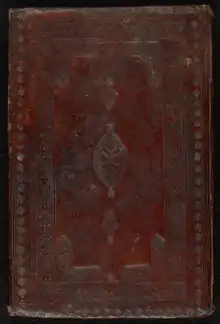Ayesha Durrani | |
|---|---|
 Front cover of an 1882 collection of Ayesha Durrani's most famous poems | |
| Born | late-18th century Afghanistan |
| Occupation | Poet |
| Nationality | Afghan |
| Notable works | ديوان عايشه (Collected Poems of Aisha Durrani) |
| Spouse | Tīmūr Shāh Durrānī |
Ayesha Durrani, also known as Aisha-i-Durani and Aisha Durrani (18th-century) was an Afghan poet, one of the wives of Timur Shah Durrani of the Durrani Empire. A number of her poems were compiled into a manuscript in 1882, and Durrani is credited with founding the first school for girls in Afghanistan.
Biography
Ayesha Durrani was born in late-18th century Afghanistan.[1] She was born into the powerful Barakzai family as the daughter of Yaʻqūb Ali Khān Barakzai, and she later married Tīmūr Shāh Durrānī, the second ruler of the Durrani Empire.[1] Ayesha is recorded as having become an active poet by the waning years of the 18th century, and continued composing poetry into the 19th century; she wrote qasidas, ghazals, and was well versed in Arabic, Persian literature and in Islamic law.[2] Durrani was also noted by several sources as having founded the first school for girls in Afghanistan.[1][3]
Following the collapse of the Durrani Empire and the rise of the Barakzai-ruled Emirate of Afghanistan in the 19th century, Ayesha's poetry garnered renewed interest. Many of her poems were compiled by an unnamed Afghan scribe into a 336-page manuscript in 1882.[1]
Legacy
Following the 1978 Saur Revolution, the Afghan government promoted the study of Durrani's works in an effort to mobilize female support for the government's social programs.[2]
After the United States-led overthrow of Afghanistan's Taliban government (which had barred women from pursuing an education after age eight),[4] a German foreign aid agency rebuilt two girls' schools in Kabul, naming one the Aisha-i-Durani School in honour of the poet.[3]
References
- 1 2 3 4 "Collected Poems of Aisha Durrani". 1881. Retrieved 12 August 2018.
- 1 2 Dupree, Nancy Hatch. 1981. Revolutionary Rhetoric and Afghan Women. The Afghanistan Council, The Asia Society. Occasional paper #23, pg. 8. Archived 2018-08-12 at the Wayback Machine
- 1 2 "With the Girls of Afghanistan: "The Pen is the Sword"". UNESCO. Retrieved 12 August 2018.
- ↑ Marsden, Peter. (1998). The Taliban: War, religion and the new order in Afghanistan. London: Zed Books Ltd, ISBN 1-85649-522-1 pp. 88-101.